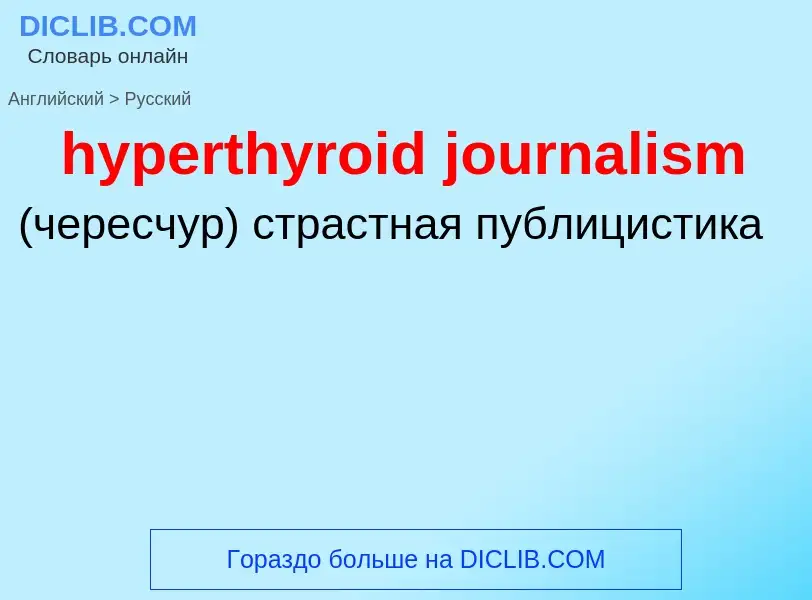Übersetzung und Analyse von Wörtern durch künstliche Intelligenz ChatGPT
Auf dieser Seite erhalten Sie eine detaillierte Analyse eines Wortes oder einer Phrase mithilfe der besten heute verfügbaren Technologie der künstlichen Intelligenz:
- wie das Wort verwendet wird
- Häufigkeit der Nutzung
- es wird häufiger in mündlicher oder schriftlicher Rede verwendet
- Wortübersetzungsoptionen
- Anwendungsbeispiele (mehrere Phrasen mit Übersetzung)
- Etymologie
hyperthyroid journalism - Übersetzung nach russisch
[ilektrɔnik'dʒə:nəliz(ə)m]
американизм
сбор
обработка и передача текущей информации по телевидению
телевизионный журнализм
Definition
Wikipedia
Open-source journalism, a close cousin to citizen journalism or participatory journalism, is a term coined in the title of a 1999 article by Andrew Leonard of Salon.com. Although the term was not actually used in the body text of Leonard's article, the headline encapsulated a collaboration between users of the internet technology blog Slashdot and a writer for Jane's Intelligence Review. The writer, Johan J. Ingles-le Nobel, had solicited feedback on a story about cyberterrorism from Slashdot readers, and then re-wrote his story based on that feedback and compensated the Slashdot writers whose information and words he used.
This early usage of the phrase clearly implied the paid use, by a mainstream journalist, of copyright-protected posts made in a public online forum. It thus referred to the standard journalistic techniques of news gathering and fact checking, and reflected a similar term—open-source intelligence—that was in use from 1992 in military intelligence circles.
The meaning of the term has since changed and broadened, and it is now commonly used to describe forms of innovative publishing of online journalism, rather than the sourcing of news stories by a professional journalist.
The term open-source journalism is often used to describe a spectrum on online publications: from various forms of semi-participatory online community journalism (as exemplified by projects such as the copyright newspaper NorthWest Voice), through to genuine open-source news publications (such as the Spanish 20 minutos, and Wikinews).
A relatively new development is the use of convergent polls, allowing editorials and opinions to be submitted and voted on. Over time, the poll converges on the most broadly accepted editorials and opinions. Examples of this are Opinionrepublic.com and Digg. Scholars are also experimenting with the process of journalism itself, such as open-sourcing the story skeletons that journalists build.

